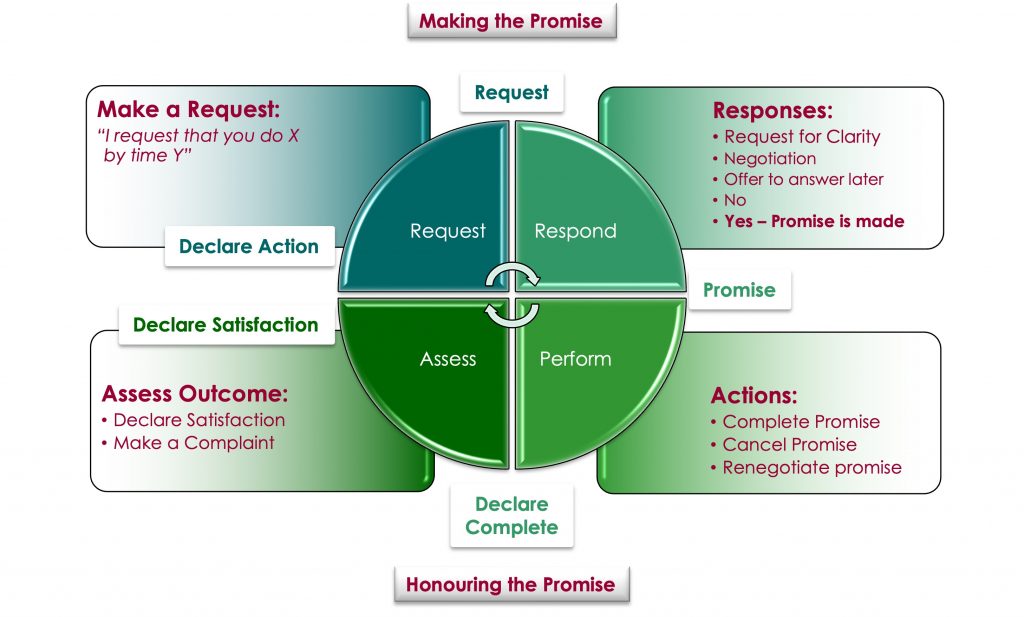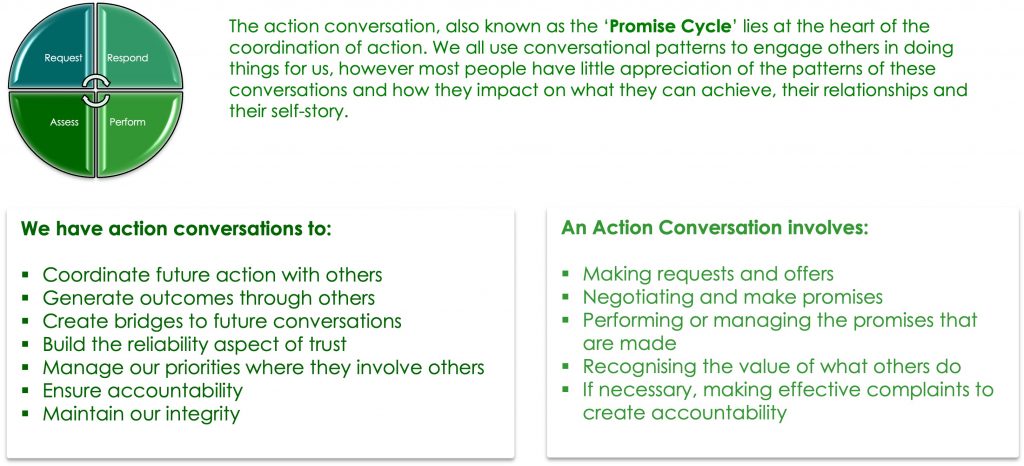
| Addresses: | How we will do it |
| Involves: | Declarations including requests, offers and promise; Assessments; and Assertions |
| Purpose: | Gain promises for action from others; Monitor performance and adjust expectations if needed; Achieve outcomes |
| Desired Outcome: | Commitment and resolution of breakdown |
| Optimal Mood: | Ambition |
Having decided what is required to address a breakdown, we may also decide to enrol others to help us thereby taking us into an ‘action conversation’. These conversations involve three specific types of declarations – requests, offers and promises.
Effective action conversations follow a very clear pattern. Although everyone is aware of aspects of this pattern, most are unaware of it as a whole. Instead, when needing help, they resort to declarations of breakdowns and descriptive conversations with the expectation that others will take action to address their breakdown. Although this may work, it is generally ineffective. This way of conversing is often a habit formed in childhood. For instance, small children often get what they want by declaring a breakdown. With a child’s declaration of “I am hungry“, a parent nearly always takes some action to give the child some food. However as an adult, other people are not as concerned with our well being or concerns and so often declarations of our breakdowns are not enough to have them resolved. We are much better served by making requests and gaining promises as a means of breakdown resolution.
The action conversation is adapted from Fernando Flores’ commitment cycle. It is a conversation that must always involve at least two people. It is a loop broken into four distinct phases, two of which are associated with the creation of a promise and two of which the honouring of that promise.

The four phases of an action conversation are:
| Phase | Effective Outcome | |
| 1 | Making a Request or offer | A request of the general form: “I request you do X by time Y” An offer of the general form: “I offer to do X by time Y” |
| 2 | Responding to a request or offer | A clear and definite promise for future action that is similarly understood by both parties. This may differ from what was originally requested or offered. |
| 3 | Performing a Promise | The promised actions are taken and completion declared by the person who made the promise. |
| 4 | Assessing a Promise | The person to whom the promise was made approves of the outcome and declares satisfaction or is dissatisfied and complains. |
Action conversations are not just about getting things done. As at least two people are always involved then these conversations will inform the future of the relationship and each individual’s self-story. Trustworthiness is always at stake in these conversations and provides a context for how they will unfold.
It is critical to understand the importance of the looping of these conversations. Any failure of the loop leaves one person unclear about what is happening and unsure of what and when to act. Each section successfully ends in a declaration – a request, a promise, a declaration of completion and a declaration of satisfaction. Those declarations not only signal completion, they also signal the beginning of the next phase of the loop. Cooperative action is best served when all involved understand what has happened and what is expected to happen next. Doing action conversations well is one of the most effective means of building trust-based relationships.
Although it is easy to think of action conversations only in terms of tasks and what is produced, they also apply to shifts in human dynamics and behaviours. In this case, the time frame may become open as a commitment is sought ongoingly. It is these sort of commitments that are generated in effective feedback conversations where a change of behaviour is requested or offered.
